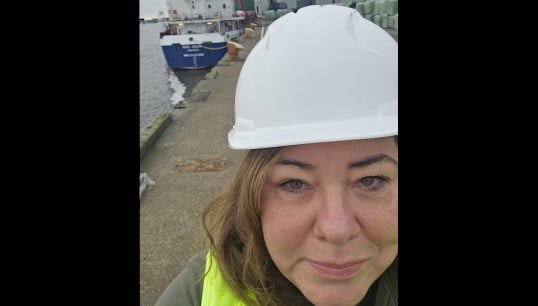- Topics
- Campaigning
- Careers
- Colleges
- Community
- Education and training
- Environment
- Equality
- Federation
- General secretary message
- Government
- Health and safety
- History
- Industrial
- International
- Law
- Members at work
- Nautilus news
- Nautilus partnerships
- Netherlands
- Open days
- Opinion
- Organising
- Podcasts from Nautilus
- Sponsored content
- Switzerland
- Technology
- Ukraine
- United Kingdom
- Welfare

Helen Meldrum, who recently began work as inspector for the International Transport Workers’ Federation (ITF) with responsibility for Scotland, talks to Rob Coston about her early experiences helping seafarers get the money they are owed and helping with a serious case of abandonment
ROB COSTON (RC): What area of the world do you cover and what do you do in the role?
HELEN MELDRUM (HM): I’m the Scottish ITF inspector. It’s a really large area – a lot of people don’t realise how big Scotland is until they’ve got to drive around it for a living!
Essentially, my role is to carry out routine inspections, mostly on flag of convenience vessels, to make sure that seafarers are in receipt of the correct wages, terms of employment, living conditions onboard, safe drinking water, nutritious food, etc.
In addition to that, as ITF inspectors we also build relationships with lots of organisations which are involved in the wellbeing of seafarers, including government bodies and charities.
RC: What kinds of seafarers are you helping in Scotland, and what common issues do you encounter?
HM: The seafarers coming in on flag of convenience vessels are predominantly from the Philippines, though the number of Indian seafarers is increasing a lot as well.
Regarding the vessels, we also see a large number of offshore vessels from oil and gas and renewables operations, plus everything that everyone else sees coming into the ports.
One of the big jobs for me is making sure the UK National Minimum Wage is being paid on offshore vessels where it should apply. That’s very difficult to manage because you have to check where they’ve been – what ports they’ve been into – because if they’ve stopped outside the UK then the National Minimum Wage might not apply. It’s a tricky bit of legislation to get your head around.
I think it’s actually quite shocking that these vessels aren’t just routinely paying
the National Minimum Wage or above, because you expect the pay to be higher, right?
RC: One of the things that surprised me about this role is how much it involves understanding laws and paperwork. Is that something you expected?
HM: A big part of my training was around how to deal with paperwork. There’s a lot of obfuscation in the industry, deliberate attempts by some unscrupulous companies to try to make things difficult for people like us. For example, there are vessels where you’ve got a strong suspicion that there’s double accounting going on, or if you talk to one of the seafarers then they might tell you they’ve actually got a different contract than the one you’ve been presented with, but they’re too scared to speak up.
To try and deal with it, I have to build trust with the seafarers. If the master is also unhappy about wages, that makes life a lot easier for us because they are more than willing to provide us with the paperwork to point out exactly where things aren’t going right. If there’s complaints from the crew but the master and the chief officer aren’t in agreement, things can be much more difficult with crew being afraid of the consequences of speaking up. We always do our best to keep things anonymous when it’s sensitive.
RC: Can you tell me about some of the cases you’ve worked on?
HM: I’ll always remember one of the very first vessels that I stepped on. I realised there was something not quite right on that vessel, I just couldn’t put my finger on it.
One of the things I can do is take a copy of the paperwork away with me. I was able to do that and methodically go through all of it, and I found that a young man had been employed as a cadet when he should have been an AB. I got him a promotion and £2,500 in back pay.
I’ve had good results with a couple of abandonment cases, which inspectors pursue internationally. One of them [during my global training period] involved a vessel off the coast of Georgia. The crew hadn’t been paid for two months, and they had no food, water or fuel. The ITF actually paid for them to get provisions –
I arranged that with a local agent. I managed to get the crew a back payment for two months of £47,000.
In a lot of abandonment cases, the seafarers who are in contact with me are repaid and repatriated. What’s amazing is they periodically message me, just to let me know how they’re getting on, to say thank you, all those sorts of things. It lets me know this is really worthwhile work.
How to get in touch with Helen Meldrum or your nearest ITF inspector
Visit the ITF Seafarers website, look up the details in the ITF Seafarers’ Bulletin magazine, or downloading the ITF Seafarers app from the Google Play or Apple stores.
If you are a member of a trade union, please contact your union directly. Nautilus members should speak to their industrial organiser or, in an emergency, contact Nautilus 24/7
Tags
